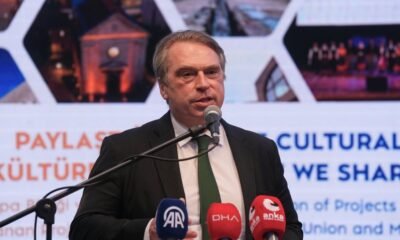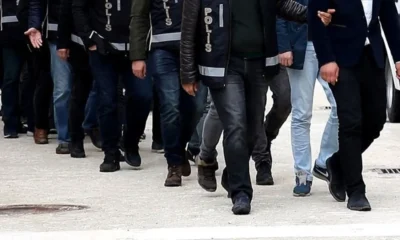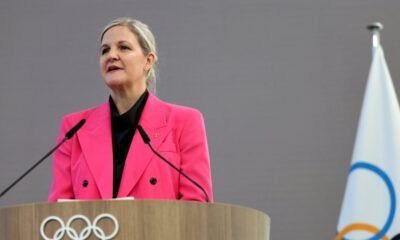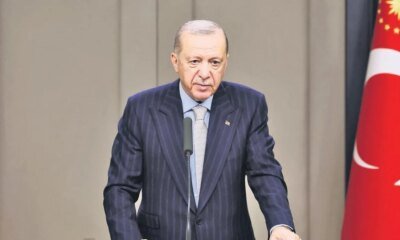Economy
Türkiye’s economic confidence rises slightly to 96.71 in June
Türkiye’s economic confidence index edged up 0.1% in June to 96.71, according to data released Thursday by the Turkish Statistical Institute (TurkStat).
The index stood at 96.65 in May.
The consumer confidence index rose 0.3% month-over-month to 85.1, while the real sector confidence index, which reflects sentiment in manufacturing, slipped 0.2% to 98.4.
Confidence in the services sector climbed 0.4% to 110.9, but sentiment in the retail trade and construction sectors declined. The retail trade confidence index dropped 2.5% to 108.5, and the construction confidence index fell 1.7% to 86.9.
The economic confidence index is a composite indicator that reflects the general economic outlook based on consumer and producer evaluations.
Economy
Türkiye, Russia pledge deeper economic ties at joint gathering
Trade Minister Ömer Bolat said Friday that Türkiye and Russia are continuing to strengthen their economic relations, emphasizing that the resilience and complementary nature of both countries’ economies offer ample opportunities for deeper cooperation.
Speaking at the 19th session of the Turkish-Russian Intergovernmental Joint Economic Commission (JEC) in Moscow, Bolat highlighted the strategic importance of both nations as regional neighbors and key players.
“The commercial and economic partnership developed over the years between Türkiye and Russia has laid the foundation for peace and stability in the region,” Bolat said.
He noted that President Recep Tayyip Erdoğan and Russian President Vladimir Putin are committed to advancing bilateral relations and working together to meet the mutual goal of increasing trade volume to $100 billion (TL 3.99 trillion).
Despite global and regional challenges, Bolat said the two countries have made significant progress in their relations. “Our joint work with Russia and our major, visionary projects are expanding. We aim to carry our future projections into the second quarter of the 21st century in line with national and international obligations, to contribute to the development of our regions, countries and peoples,” he said.
Bolat added that a memorandum of understanding to be signed at the conclusion of the JEC meeting, along with its accompanying agreements, would further boost economic and trade ties between the two nations.
Recalling the shocks Türkiye has faced in recent years, including the COVID-19 pandemic and a devastating earthquake that struck 11 provinces, Bolat thanked Russia for its aid during the disaster. “Despite the difficulties, under President Erdoğan’s leadership, our country has shown resilience and has largely overcome these challenging times,” he said.
Bolat pointed to Türkiye’s uninterrupted growth over the past 19 quarters, noting that the economy grew by 3.2% last year, reaching a size of $1.3 trillion. He said exports, which stood at $36 billion in 2002, surged to $262 billion in 2024 – nearly a sevenfold increase.
“The undeniable potential of the Turkish economy is resonating globally,” Bolat said. “The World Bank recently revised Türkiye’s 2024 growth forecast upward from 2.6% to 3.1%.”
Bolat also praised Russia’s economic performance, saying it exceeded global expectations. According to International Monetary Fund (IMF) data, the Russian economy grew by 4.1% in both 2023 and 2024.
Thanks to JEC meetings, Bolat said Türkiye and Russia have been able to develop a multi-layered and wide-ranging economic relationship. “Our regularly held high-level Joint Economic Commission meetings are a clear result of this dynamic interaction,” he added.
Economy
Beijing, Washington finalize trade framework after London talks
China confirmed on Friday details of a trade deal with the United States, saying Washington would lift “restrictive measures” while Beijing will “review and approve” items under export controls.
“It is hoped that the United States and China will meet each other halfway,” a spokesperson for the Commerce Ministry said in a statement.
The White House on Thursday said both sides had reached an understanding on issues including expediting rare earth shipments to the U.S.
After talks in Geneva in May, Washington and Beijing agreed to temporarily lower steep tit-for-tat tariffs on each other’s products.
China also committed to easing some non-tariff countermeasures, but U.S. officials later accused Beijing of violating the pact and slow-walking export license approvals for rare earths.
Both sides eventually agreed on a framework to move forward with their Geneva consensus following talks in London this month.
A White House official told Agence France-Presse (AFP) on Thursday that President Donald Trump’s administration and China had “agreed to an additional understanding for a framework to implement the Geneva agreement.”
This clarification came after Trump told an event that Washington had “just signed” a deal relating to trade with China, without providing further details.
Beijing confirmed Friday that an agreement had been reached.
“Following the London talks, the teams from both sides have maintained close communication,” the Commerce Ministry spokesperson said.
“Recently, with approval, both sides further confirmed the details of the framework,” they said, adding that China “will review and approve applications for the export control items that meet the requirements in accordance with the law.”
“The U.S. side will correspondingly cancel a series of restrictive measures against China.”
Economy
US economy shrinks by 0.5% in Q1, more than initially estimated
The U.S. economy contracted more than previously estimated in the first three months this year, according to fresh government data released on Thursday, with consumer spending and exports both weaker than expected.
U.S. gross domestic product (GDP) decreased at an annual rate of 0.5% in the first quarter, according to the Department of Commerce.
This was down from an earlier estimate of a 0.2% decline, and lower than the 2.4% increase in the fourth quarter last year.
The data came after an import surge that was triggered by U.S. President Donald Trump’s sweeping tariffs since returning to the White House this year.
Businesses had stockpiled goods to try and get ahead of Trump’s levies targeting most trading partners, especially goods from China.
Imports are a subtraction in the calculation of GDP.
But the revision on Thursday mainly reflected “downward revisions to consumer spending and exports,” said the Commerce Department.
This was partly offset by a downward revision to imports, the department added.
While Trump has backed off or postponed some of his most punishing trade salvos as trade negotiations are ongoing, a July deadline approaches for higher tariff levels to kick in for dozens of economies, adding to uncertainty in the economy.
Economy
Top NGO organizes trade facilitation meeting between Türkiye, UK
A leading Turkish nongovernmental organization (NGO), the Independent Industrialists and Businessmen Association (MÜSIAD), organized on Wednesday a roundtable at Britain’s House of Lords to facilitate trade between the two countries and to discuss mutual opportunities for cooperation.
Hosted by Baroness Uddin, a member of the House of Lords, the upper chamber of the British Parliament, the roundtable, titled “Business Without Barriers: Removing Obstacles in U.K.-Türkiye Trade,” was attended by over 10 members of Parliament as well as businesspeople, investors and sector representatives from both countries.
Speaking at the meeting, where representatives of MÜSIAD U.K. were also present, MÜSIAD President Burhan Özdemir said Türkiye is a strategic partner for the U.K. with its strong industrial infrastructure, production capacity and geographical advantages.
“Türkiye is a natural bridge between Europe, Asia and the Middle East. We combine this advantage with production, exports and entrepreneurship,” he said.
Noting that MÜSIAD represents approximately 35% of Türkiye’s trade and industrial production with more than 14,000 members and more than 60,000 companies, Özdemir emphasized that making the free trade agreement (FTA) between the two countries more inclusive is vital not only for trade but also for long-term strategic cooperation.
“When the U.K.’s strength in service exports is combined with Türkiye’s growth potential in this field, it will be possible to produce mutual benefits in digital, financial and professional services. As MÜSIAD, we are ready to actively contribute to this process,” he said.
MÜSIAD U.K. Chairperson Türkan Akbaş highlighted that the current FTA only covers trade in goods and that the exclusion of areas such as services, investment protection, public procurement, digital trade and mutual recognition of professional qualifications from the agreement is particularly challenging for small- and medium-sized enterprises (SMEs).
Explaining that the complexity of visa processes, inequality in access to public tenders and obstacles in mutual service provision cause the economic potential between the two countries to remain below its maximum potential, Akbas made the following assessments: “In 2024, bilateral trade reached 27.8 billion pounds ($38 billion). With comprehensive modernization, this figure could increase by 25%. The U.K.’s financial and digital strength combined with Türkiye’s manufacturing capability can build a much stronger economic architecture.”
“The scope of the FTA should be expanded and the negotiations should be completed quickly for human mobility, knowledge sharing and a trust-based partnership between the two countries.”
Türkiye’s Ambassador to the U.K. Osman Koray Ertaş delivered the opening speech at the event, where British MP and U.K. Trade Representative to Türkiye Afzal Khan emphasized the need to make trade more inclusive.
Özlem Bacak, secretary-general and trade investment advisor of MÜSIAD U.K., said that the modernization of the FTA is an environmental as well as economic necessity and that green production, environmental standards and circular supply chains should be included in the scope of the agreement.
During the meeting, the chairperson of the APPG Türkiye Friendship Group, Tahir Ali, an MP for Birmingham Hall Green and Moseley, Selim Sar, chairperson of the MUSIAD Overseas Organization Commission, Ülker CEO Özgür Kölükfakı, HSBC Global Trade Solutions Director Stephanie Betant, MÜSIAD U.K. Chairperson Sectoral Boards Batuhan Bajdaroğlu and strategy and finance consultant Conor Clifford Murphy evaluated the cooperation opportunities between the two countries.
Economy
Steel, non-ferrous exports drive Türkiye’s foreign trade with $2.7B
Türkiye’s steel and non-ferrous metals sectors delivered a combined $2.7 billion in exports in May, accounting for 12.7% of the country’s total exports, official data showed Tuesday.
The steel sector recorded $1.5 billion in exports, up 3.6% from a year earlier, while non-ferrous metals reached $1.2 billion, marking a 2.6% increase, according to the Mediterranean Exporter Associations (Akdeniz Demir ve Demir Dışı Metaller İhracatçıları Birliği (ADMIB).
ADMIB Chairperson Fuat Tosyalı said the sector has maintained its production strength despite global challenges, adding that sustainability and environmental responsibility are at the heart of the industry’s progress.
“This success stems from a determined, long-term approach centered on environmental sensitivity,” Tosyalı said. “We view new regulations, including the European Green Deal, not just as compliance but as transformation opportunities.”
In ADMIB’s own May exports, non-ferrous metals rose 4% to $74 million, while steel exports dropped 5% to $188 million compared to the same month last year.
Germany remained Türkiye’s top steel export destination, followed by Italy, Romania, Spain and the United Kingdom. Exports to Belgium surged 167%, Spain 64% and Ukraine 49%.
For ADMIB, Romania led May exports, trailed by Italy, Iraq, Germany and Egypt. Notable increases included Lebanon with 203%, Ukraine with 143% and Morocco with 106%.
“We are moving forward with a strong sense of responsibility toward quality, the environment and future generations,” Tosyalı said. “This will ensure our sector remains a powerful player not only today but in the years ahead.”
Economy
Şimşek notes narrowing inflation expectation gap as positive sign
Finance and Treasury Minister Mehmet Şimşek said inflation expectations among the real sector and market participants continued to decline, calling the narrowing gap between household and market expectations “an important development” for breaking inflation inertia.
In a social media post on Tuesday, Şimşek evaluated the Central Bank of the Republic of Türkiye’s (CBRT) June 2025 “Sectoral Inflation Expectations” report.
He noted that inflation expectations decreased across all segments in June, with households’ 12-month inflation expectation dropping by 7 percentage points compared to last month and 19 points compared to the same period last year.
“The gap between household and market expectations has fallen to its lowest level in about six years, which is significant for breaking inflation inertia,” Şimşek said. “This improvement in expectations shows that the program we are implementing is progressing toward its goal with effective and decisive steps.”
He added that easing geopolitical tensions have led to lower oil prices, and that a continued decline in inflation would create more supportive domestic financial conditions for the real sector.
-

 Politics3 days ago
Politics3 days agoEU ambassador says ‘shameful’ to demand visas from Turks
-

 Daily Agenda3 days ago
Daily Agenda3 days agoLast minute: FETÖ Operation in TSK in 41 provinces: 174 of the muvazzaf, 176 soldiers detention decision
-
Daily Agenda3 days ago
It is not that disappointment
-

 Daily Agenda3 days ago
Daily Agenda3 days agoUN: Children in Gaza may die of thirst
-

 Daily Agenda2 days ago
Daily Agenda2 days agoNEW BY NEWSHIP GOK INVESTIGATION NEW DEVELOPMENT! 100 years imprisonment request
-

 Sports3 days ago
Sports3 days agoKirsty Coventry inaugurated as new IOC president for 8-year term
-

 Lifestyle2 days ago
Lifestyle2 days agoVan’s Çalyan glacier lake draws nature fans to eastern Türkiye
-

 Daily Agenda2 days ago
Daily Agenda2 days agoOur region cannot lift the burden of war – last minute news




